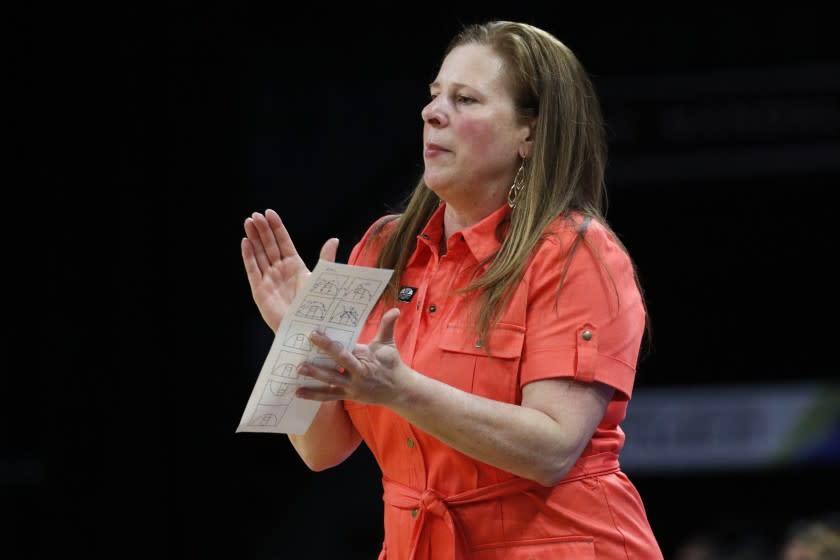UCLA, USC ready to take it to the next level in Pac-12 and NCAAs

Even when the offseason is six months long, there’s no time to rest when you're competing in the Pac-12.
“I know that I play in the best conference in America right now and if you don’t come in focused and motivated to play hard, then you’re not going to succeed,” USC sophomore guard Endyia Rogers said Friday in a videoconference call as the Trojans continued their second week of full practice.
Both USC and UCLA are focused on reaching the next level of success while navigating a punishing 22-game Pac-12 schedule during the coronavirus-shortened season. For Rogers and the Trojans, it's reaching the NCAA tournament for the first time since 2014. The Bruins are shooting for another long postseason run.
UCLA had the No. 2 seed in the Pac-12 tournament last season, its highest position in coach Cori Close’s tenure, but failed to advance out of the semifinals for the fourth straight year.
Close is hoping to push the Bruins forward with a new offense: a five-out, motion scheme inspired by position-less basketball popular at the professional levels. The system hinges on versatility, especially in the post position with Michaela Onyenwere and 6-foot-4 freshman Emily Bessoir. The goal is to get wide-open three-point shots and layups.
“There’s only seven teams in the country that have won as much as we have in the postseason,” Close said Wednesday, as her Bruins are one of eight teams to make four straight NCAA regional semifinals. "But we haven’t been to the Final Four yet. We haven’t won a national championship yet.”
The Bruins built their foundation on defense and rebounding. UCLA finished second in the Pac-12 in rebounding last year with 41.6 per game. They led the league in turnovers forced, which helped UCLA rank third in scoring.
But Close, who oversees the team’s offense, recognized that fast-break points aren’t enough to propel a team to a championship. Against top competition, the UCLA offense disappeared, as in an 80-66 loss to Oregon in February. The Bruins scored a season-low 51 points in the Pac-12 tournament semifinal against Stanford.
Needing to learn the new offense through virtual meetings during the summer was difficult at first, Onyenwere said, especially with the number of plays.
“It’s definitely been an adjustment, but I think we’ve adjusted pretty well and we’re starting to get the hang of it,” said Onyenwere, who was the Pac-12’s second-leading scorer at 18.9 points a game last season. “I think during the season, it’s going to be really, really fun.”
While UCLA is hoping to make a deep NCAA tournament run, USC is focused on just making the field. With seven freshmen last year, the Trojans finished seventh in the Pac-12, and, as the highest-ranked team in the conference without an NCAA bid, were slated to play in the WNIT before the season was canceled.
USC returns 74.3% of its scoring from last year, including Pac-12 freshman of the year Alissa Pili, who averaged 16.3 points and eight rebounds a game. The team added graduate transfer Jordan Sanders, who averaged 20.3 points per game as a sophomore at UC Irvine two seasons ago.
Pili returned home to Alaska during the extended offseason and stayed in shape by working out with her siblings, including her older brother Brandon, a defensive lineman on the USC football team. After helping her team win four of its last five games, Pili was motivated to continue the momentum.
“I just had it in my mind that I can’t come in not prepared because my team is counting on me,” Pili said Friday. “I can’t let them down.”
This story originally appeared in Los Angeles Times.


